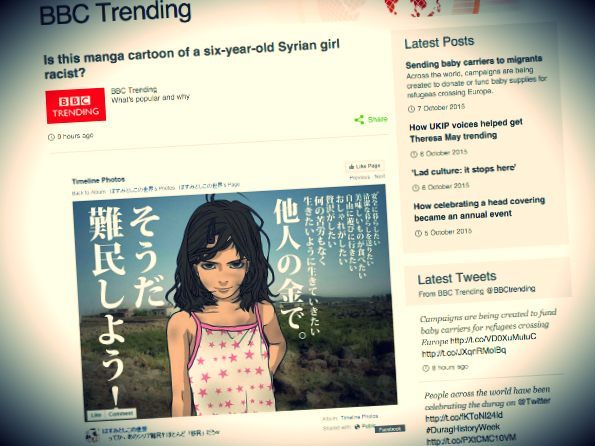It remains unclear whether the BBC intends to waste licence fee payers’ money writing about every Change.org petition that gets 10,000 signatures, or whether they reserve that privilege of publicly funded publicity for things with the word “racist” in the headline. Either way, they’ve gone off the deep end again today, publishing 600 words pondering a manga cartoon that has apparently “offended” a proportionately very small number of “Japan’s netizens“.
Are you keeping up with this so far? Because you’re paying for it. Here’s the story, in brief:
Some magna artist in Japan drew a cartoon of a Syrian migrant child. The text behind the toon implied that she was a freeloader. Some Japanese internet users called it racist. Then the BBC went mental.
But the cartoon is obviously not “racist”. I mean, its not even close. Let’s look at the Oxford English Dictionary definition of “racism”:
“Prejudice, discrimination, or antagonism directed against someone of a different race based on the belief that one’s own race is superior”
So why does the BBC’s Michael Wendling feel the need to pump up the issue, and ask the question on the BBC Trending website? I’ll try not to be Captain Obvious.
Here’s what the text of the cartoon says:
“I want to live a safe and clean life, have a gourmet meal, go out freely, wear pretty things and luxuriate. I want to live my life the way I want without a care in the world — all at the expense of someone else.
“I have an idea. Why don’t I become a refugee?”
At worst… at the very worst… this is insensitive. At its best, it is actually pretty accurate of what some of the migrants have themselves said or implied they’re trying to do, with a little artistic licence, because, let’s face it… it’s art.
I mean, swap out “gourmet meal” and “wear pretty things” for “beer” and “wifi” and you’ve got the truth behind some of the migrants’ behaviour and demands. Some of them have even done some research into the types of prisons they might end up in.
And at someone else’s expense? Is that untrue? With natives being evicted from their life-long homes, and Germany now declaring that it may have to raise the retirement age to accommodate migrants? Oh yeah, and the want to scrap the minimum wage, and it’ll cost the German tax payer well in advance of half a billion euros to pay for all this.
Perhaps the only part of the cartoon that isn’t true is the “safe and clean life” part. As we’ve seen, a lot of the young men (for that is the majority, despite what the BBC might try and tell you) don’t seem that interested in cleanliness and safety. A German local authority has even had to issue guidance for migrants reminding them that Germany is a clean country. Their words, not mine. And safety? Ha. I mean HA!
So yes, they do get the idea to become “refugees” as the cartoon so kindly put it. Syria’s Google search history identifies as much. And this guy let the mask slip by claiming that unless he got to go to Germany, he’d just pop back over to war-torn Syria, no problem.
In conclusion, I leave you with the words of the artist, Toshiko Hasumi:
“It is my understanding that most of the refugees fleeing Syria this time are bogus asylum seekers. Instead of traveling around furtively like before, those illegal migrants are now inundating other countries through the front door… I have no problem with genuine refugees who really are unfortunate. This illustration is supposed to be a dig at those ‘bogus refugees’ who are exploiting the world’s sympathy for those truly in trouble.”
So is the cartoon racist? No, of course it bloody well isn’t.

COMMENTS
Please let us know if you're having issues with commenting.